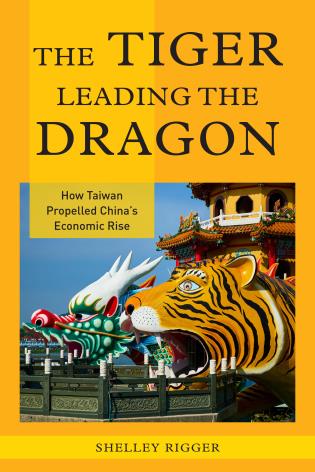Join us for a free one-day workshop for educators at the Japanese American National Museum, hosted by the USC U.S.-China Institute and the National Consortium for Teaching about Asia. This workshop will include a guided tour of the beloved exhibition Common Ground: The Heart of Community, slated to close permanently in January 2025. Following the tour, learn strategies for engaging students in the primary source artifacts, images, and documents found in JANM’s vast collection and discover classroom-ready resources to support teaching and learning about the Japanese American experience.
The Tiger Leading the Dragon: How Taiwan Propelled China's Economic Rise
Please join the USC U.S.-China Institute for a conversation with Shelley Rigger about her new book, which traces the development of the cross-Taiwan Strait economic relationship and explores how Taiwanese firms and individuals transformed Chinese business practices.

Left: Shelley Rigger | Right: Artist conception of new Taiwan Semiconductor Manufacturing Company plant in Nanjing, China
Click here to watch the video.
 How did the once-secretive, isolated People’s Republic of China become the factory to the world? Shelley Rigger argues the answer is Taiwan. In The Tiger Leading the Dragon, she follows the evolution of Taiwan’s influence from the period when Deng Xiaoping lifted Mao’s prohibitions on business in the late 1970s, allowing investors from Taiwan to collaborate with local officials in the PRC to transform mainland China into a manufacturing powerhouse. After World War II, Taiwan’s fleet-footed export-oriented manufacturing firms became essential links in global supply chains. In the late 1980s, Taiwanese firms seized the opportunity to lower production costs by moving to the PRC, which was seeking foreign investment to fuel its industrial rise. Within a few years, Taiwan’s traditional manufacturing had largely relocated to the PRC, opening space for a wave of new business creation in information technology. The Tiger Leading the Dragon traces the development of the cross-Taiwan Strait economic relationship and explores how Taiwanese firms and individuals transformed Chinese business practices. Rigger’s book also reveals Taiwanese contributions to Chinese consumer behavior, philanthropy, religion, popular culture, and law.
How did the once-secretive, isolated People’s Republic of China become the factory to the world? Shelley Rigger argues the answer is Taiwan. In The Tiger Leading the Dragon, she follows the evolution of Taiwan’s influence from the period when Deng Xiaoping lifted Mao’s prohibitions on business in the late 1970s, allowing investors from Taiwan to collaborate with local officials in the PRC to transform mainland China into a manufacturing powerhouse. After World War II, Taiwan’s fleet-footed export-oriented manufacturing firms became essential links in global supply chains. In the late 1980s, Taiwanese firms seized the opportunity to lower production costs by moving to the PRC, which was seeking foreign investment to fuel its industrial rise. Within a few years, Taiwan’s traditional manufacturing had largely relocated to the PRC, opening space for a wave of new business creation in information technology. The Tiger Leading the Dragon traces the development of the cross-Taiwan Strait economic relationship and explores how Taiwanese firms and individuals transformed Chinese business practices. Rigger’s book also reveals Taiwanese contributions to Chinese consumer behavior, philanthropy, religion, popular culture, and law.
Shelley Rigger is Brown Professor of political science at Davidson College. She frequently writes for think tanks (e.g., Brookings Institution) and speaks to Congressional panels (e.g., Dec. 2020) and military workshops. Her books include Why Taiwan Matters: Small Island, Global Powerhouse (which she shared at USC) on Taiwan’s place in the world and two volumes on Taiwan's domestic politics, Politics in Taiwan: Voting for Democracy and From Opposition to Power: Taiwan's Democratic Progressive Party. Prof. Rigger was based in Taiwan as a Fulbright Senior Scholar in 2019-2020. She joined our 2020 election roundtable.
Featured Articles
Please join us for the Grad Mixer! Hosted by USC Annenberg Office of International Affairs, Enjoy food, drink and conversation with fellow students across USC Annenberg. Graduate students from any field are welcome to join, so it is a great opportunity to meet fellow students with IR/foreign policy-related research topics and interests.
RSVP link: https://forms.gle/1zer188RE9dCS6Ho6
Events
Hosted by USC Annenberg Office of International Affairs, enjoy food, drink and conversation with fellow international students.
Join us for an in-person conversation on Thursday, November 7th at 4pm with author David M. Lampton as he discusses his new book, Living U.S.-China Relations: From Cold War to Cold War. The book examines the history of U.S.-China relations across eight U.S. presidential administrations.




